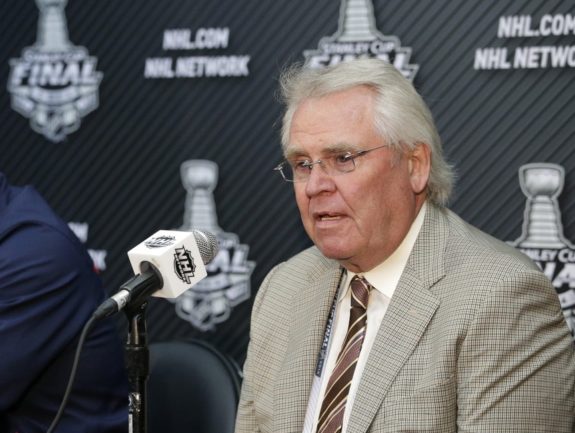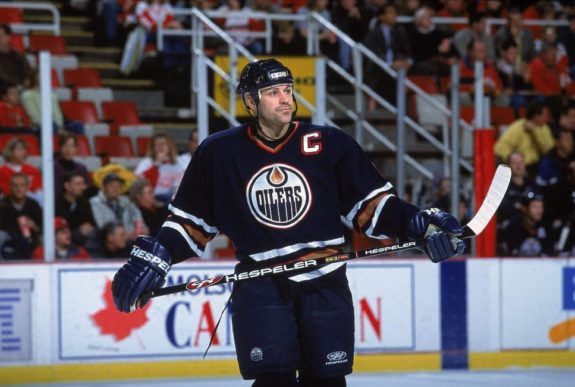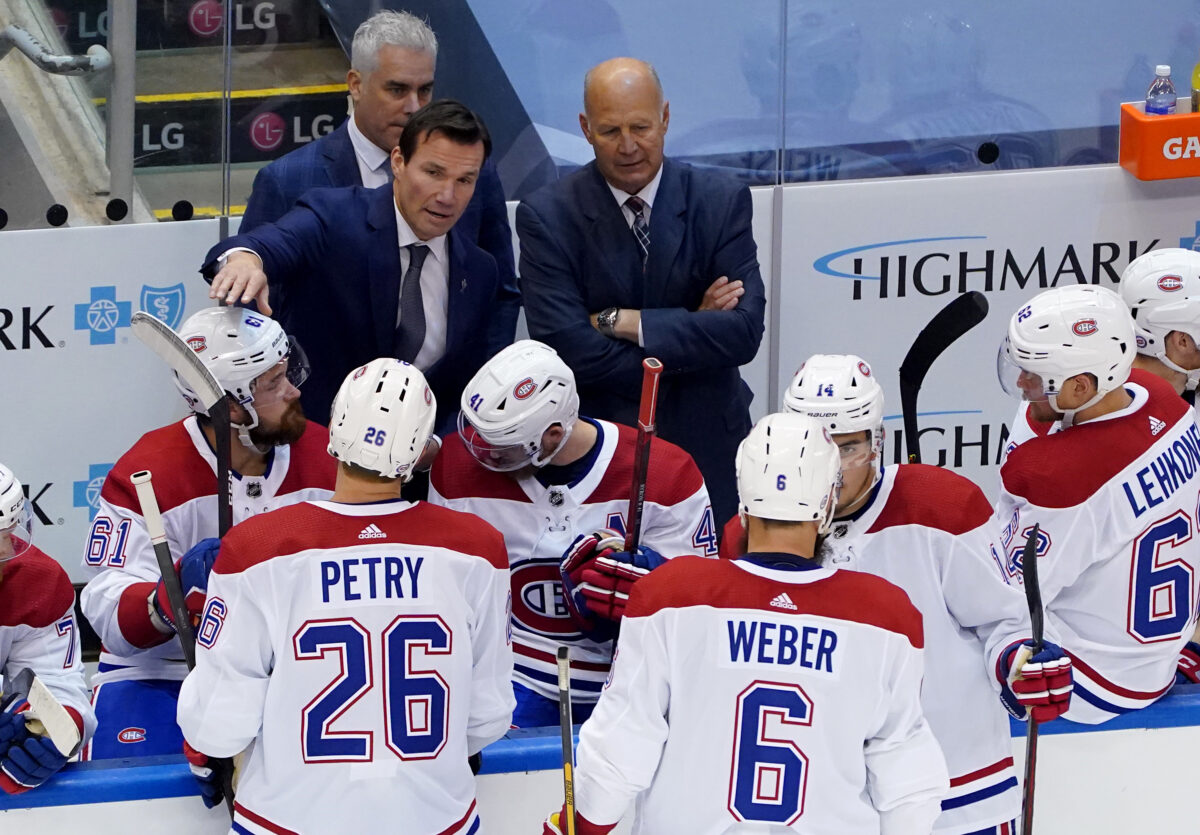We’ve seen a lot lately of Montreal Canadiens assistant coach Luke Richardson, who filled in for Habs head coach Dominique Ducharme during Montreal’s 2021 Stanley Cup Playoffs Semifinal Series victory over the Vegas Golden Knights.
Ducharme went into isolation after testing positive for the coronavirus before Game 3, and the Canadiens have since gone 3-1 and punched their ticket to the Stanley Cup Final with Richardson running the bench.
Having the cameras trained on him during stoppages in play, answering the same questions at press conferences – this is all new to Richardson on the game’s biggest stage. He’s been coaching for 12 years, but keeping Ducharme’s seat warm is the closest thing the 52-year-old has had to an NHL head coach gig.
Richardson was never in the spotlight during his 21 seasons as a player in the NHL either, even though he ranks tenth all-time for games played by a defenceman, with 1,417.
Such is the plight of the defensive defenceman. Even in a hockey-centric city like Edmonton, where he had the longest stay of his six NHL stops, Richardson didn’t enjoy the star status of his higher-scoring, flashier teammates.
Importance in Edmonton
In 436 games with the Oilers, Richardson totaled all of 13 goals and 78 points. He never scored more than three times in any of his six Edmonton seasons.
Forget the stats. What Richardson meant to Edmonton is made appreciable by his being named Oilers Defenceman of The Year twice. Or receiving the team’s Community Service Award. Or the three seasons he served as one of Edmonton’s alternate captains.
Richardson is one of just two players (Kelly Buchberger being the other) with the team in 1992 for the last of its 13 consecutive playoff appearances and was still there when Edmonton returned to the postseason in 1997, toughing out four seasons of rebuilding. While his defensive partners came and went, he provided a foundation for the bridge that traversed the end of Edmonton’s glory years in the early ’90s with the Oilers’ renaissance later that decade.
From the ‘Borough to the Show
A native of Ottawa, Richardson was drafted seventh overall by the Toronto Maple Leafs in 1987 after playing two years of major junior with the Peterborough Petes in the OHL. An 18-year-Richardson made his pro debut on Oct. 8, 1987, at historic Chicago Stadium, in Toronto’s season-opening 7-5 win against the host Chicago Blackhawks. He would never spend a minute of his career in the minors.
Richardson played his first four NHL seasons (1987-88 to 1990-91) with the Leafs, compiling 11 goals and 36 assists in 278 games. He led the team with 238 penalty minutes in 1990-91. The blueliner also appeared in seven playoff games during his Toronto tenure.
Blockbuster Deal
The NHL regular season was only two weeks away when the trade came down on Sept. 19, 1991: Oilers general manager Glen Sather was sending a pair of five-time Stanley Cup champions and future Hall-of-Famers in Glenn Anderson and Grant Fuhr, along with Craig Berube, to the Leafs for forwards Vincent Damphousse and Scott Thornton, goaltender Peter Ing, and Richardson.
“I’m sorry to see players like Grant and Glenn go, but I have to think in terms of the future of the Edmonton Oilers,” Sather said. “We’re getting some incredible young talent in return and this team will be a force to be reckoned with for years to come.” (from ‘Oilers Trade Fuhr and Anderson’, The New York Times, 9/20/91)
Related: Glenn Anderson Trade Revisited
Damphousse was an All-Star for the Oilers, but his stay in Edmonton lasted less than 12 months before he was dealt to Montreal. Ing also spent just one season with the Oilers, appearing in 12 games in 1991-92. Thornton played 209 games for Edmonton in a bottom-six role. It was Richardson that made the greatest impact over the longest duration.
Richardson played 75 games in his first season with the Oilers, 1991-92, setting NHL career highs for assists (19) and points (21). He appeared in all 16 of Edmonton’s playoff contests, recording 5 assists and 45 penalty minutes as the Oilers defeated the Los Angeles Kings 4-2 in the Smythe Division Semifinal and bested the Vancouver Canucks in six games in the Smythe Division Final before being swept by Chicago in the Campbell Conference Championship.
Rebuilding Block
The 1992 playoffs marked the ninth time in 11 years that Edmonton had at least reached the conference championship series, but these Oilers were a shadow of the team that won five Stanley Cups between 1984 and 1990.
The bottom finally fell out in 1992-93, when Edmonton finished with one of the league’s worst records and missed the playoffs for the first time since joining the NHL in 1979-80. Edmonton entered a full-blown rebuild, and with Sather making trade after trade exchanging veterans for youth, Richardson’s role became one of great significance.

In 1992-93 Richardson was named Edmonton’s Defenceman of the Year after playing 82 games, recording 13 points and 142 penalty minutes. Two of his three goals came on the penalty kill, tied for the fourth most short-handed goals by an Oilers defenceman in a single season.
The Oilers sunk to the bottom of the Pacific Division standings in 1993-94. Richardson had eight points and 139 penalty minutes in 69 games, missing an extended period for the first time in his career after suffering a fractured cheekbone.
Mid-season trades of Chris Joseph, Dave Manson and Geoff Smith left Richardson as Edmonton’s longest-tenured blueliner. Before the following season began, Richardson was named alternate captain and would wear the ‘A’ for the remainder of his time in Edmonton, bringing honor to the letter during the captaincies of Shayne Corson and Buchberger.
Road Back to the Playoffs
Edmonton began to show signs of progress in 1994-95, a season shortened to just 48 games after being delayed by a lockout that lasted from October to January. Richardson received the Oilers Defenceman of the Year award for a second time in three years, after leading all Oilers blueliners with 46 games played and ranking second among the team’s rearguards with 13 points.

Bolstered by the emergence of centre Doug Weight as one of the league’s top playmakers and the mid-season addition of superstar goalie Curtis Joseph, the Oilers continued their upward trend in 1995-96. While they missed the postseason for a fourth straight year, their 68 points were the most in that span. Richardson was the only Oilers defenceman to play all 82 games, as he notched 11 points and 108 penalty minutes. He received Edmonton’s Community Service Award at season’s end.
Not content with sitting around that spring watching the NHL playoffs, Richardson headed to Vienna, Austria, where he helped Team Canada capture silver in the 1996 IIHF Men’s World Championship. It was his second time in three years representing his country at Worlds; he was a member of the 1994 squad in Italy that beat Finland in a shootout to end Canada’s 33-year gold-medal drought at the Championship.
Edmonton finished seventh in the Western Conference in 1996-97, clinching its first playoff berth since 1992. For a second consecutive season, Richardson was the only Edmonton D-man to suit up for each of the Oilers’ 82 contests. He recorded 12 points and tied for third on the team with a plus-minus of nine.
In the opening round of the 1997 postseason, the Oilers authored one of the great playoff victories in franchise history, upsetting the Dallas Stars 4-3 on Todd Marchant’s iconic goal in overtime of Game 7. Edmonton was eliminated 4-1 by the Colorado Avalanche in the second round. Richardson played all 12 games that postseason, notching two assists, in what would prove his final days wearing copper and blue.
Taking Off to Philly
Having played 10 seasons in the NHL, Richardson became an unrestricted free agent for the first time and hit the 1997 offseason on the open market. It didn’t take long for him to cash in, signing a five-year deal with the Philadelphia Flyers worth $12.6M US. He would make nearly as much in his first season with the Flyers as he had in his entire NHL career to that point.
“It’s an exciting time for myself and my family knowing we’ll have a really big boost in the financial department not only for our lives, but our kids’ lives,” Richardson said. “I’m very excited to sign and have this opportunity to set myself up, and basically my kids, for life.” (from ‘Flyers Sign Free-Agent Defenseman Richardson’, The Morning Call, 7/15/97)
Over five seasons (1997-98 to 2001-02) with the Flyers, Richardson played 387 games and another 34 in the playoffs. In 2000 the Flyers reached the Eastern Conference Finals, losing in seven games to the eventual league champion New Jersey Devils, the closest he would come to reaching the Stanley Cup Final series. In 2000-01, he led Philadelphia with 128 penalty minutes and was second with a rating of plus-23.
Captain Columbus
On Independence Day in 2002, Richardson signed with the Columbus Blue Jackets. Before the 2003-04 season, he was named the third captain in franchise history.
Richardson played 190 games over parts of three seasons (2002-03, 2003-04, 2005-06) with the Blue Jackets; on March 8, 2006, in the final year of his contract, he was dealt by Columbus to the Maple Leafs on March 8, 2006, in exchange for a conditional draft pick. He finished the season in Toronto, dressing for 21 games with the Leafs.
Final Seasons
Richardson’s second stay in Toronto was a short one: On July 11, 2006, the veteran blueliner agreed to a one-season contract worth $500,000 with the Tampa Bay Lightning, but he played just 27 games for the Bolts in 2006-07.
On Aug. 8, 2007, Richardson joined the Ottawa Senators. He closed out his career in his hometown, playing 76 games in 2007-08 and two more in 2008-09, before deciding to hang up the skates, announcing his retirement on Nov. 2, 2008. The Senators paid tribute to him with a retirement ceremony prior to their home game against Toronto at Scotiabank Place on Feb. 28, 2009.
“It was a long career. You can’t have any regrets in that respect,” Richardson told the Senators’ official website. “I was fortunate to play a long time and get a lot of opportunities and have a good career. I enjoyed every minute of it. It’s the best league to play in if you’re a hockey player.”
Coaching Career
Richardson immediately transitioned into coaching, joining the Senators’ staff in 2009 as an assistant, a position he held through the end of the 2011-12 season. He then coached the Binghamton Senators, Ottawa’s AHL affiliate, from 2012 to 2016, compiling a 153-120-31 regular-season record and making two trips to the Calder Cup playoffs.

Hockey Canada named Richardson as it’s head coach for the 2016 Spengler Cup, and he guided the team to gold at the annual Christmastime tournament. He then returned to the NHL as an assistant coach with the New York Islanders for the 2017-18 season. On July 9, 2018, Richardson joined Montreal’s coaching staff as an assistant under head coach Claude Julien. He remained on staff after Julien was fired on Feb. 24 and replaced on an interim basis by Ducharme.
Doing It For Daron
In November 2010, Richardson lost his 14-year-old daughter Daron to suicide. That tragedy led him and his wife Stephanie to start Do It For Daron (DIFD), a mental health campaign supporting education, awareness, and research initiatives at the Royal Ottawa Foundation for Mental Health. Richardson wears a DIFD pin, which he tapped while blowing a kiss after his first win as head coach, in Game 2 against Vegas.
“Daron is always in my heart and in our hearts,” Richardson said. “I just thought it was a perfect time to pay a little tribute to her because we definitely miss her.” (from ‘Late Daughter Daron Inspires Canadiens Coach Luke Richardson’, USA Today, 6/21/21)
Richardson will be behind the bench for the Habs in Games 1 and 2 of the Stanley Cup Final against the Tampa Bay Lightning. Ducharme will be able to rejoin Montreal for Game 3 after completing 14 days in quarantine.
Given the incredible job that he is doing, Richardson suddenly finds himself being talked about as a top candidate for a head coach position in the NHL. Few would argue that. After a lifetime under the radar, he is finally getting the recognition he deserves.